ASTANA – For many years, the Olympic podium in artistic gymnastics seemed a distant dream for Kazakh athletes. But fast forward to the 2024 Paris Olympics, Nariman Kurbanov took the Olympic podium winning silver in men’s pommel horse. Kurbanov, 26, is among the few gifted Kazakh athletes to rise up in the gymnastics ranks. In an interview with The Astana Times, he shared the joy and tears behind his inspiring Olympic journey.
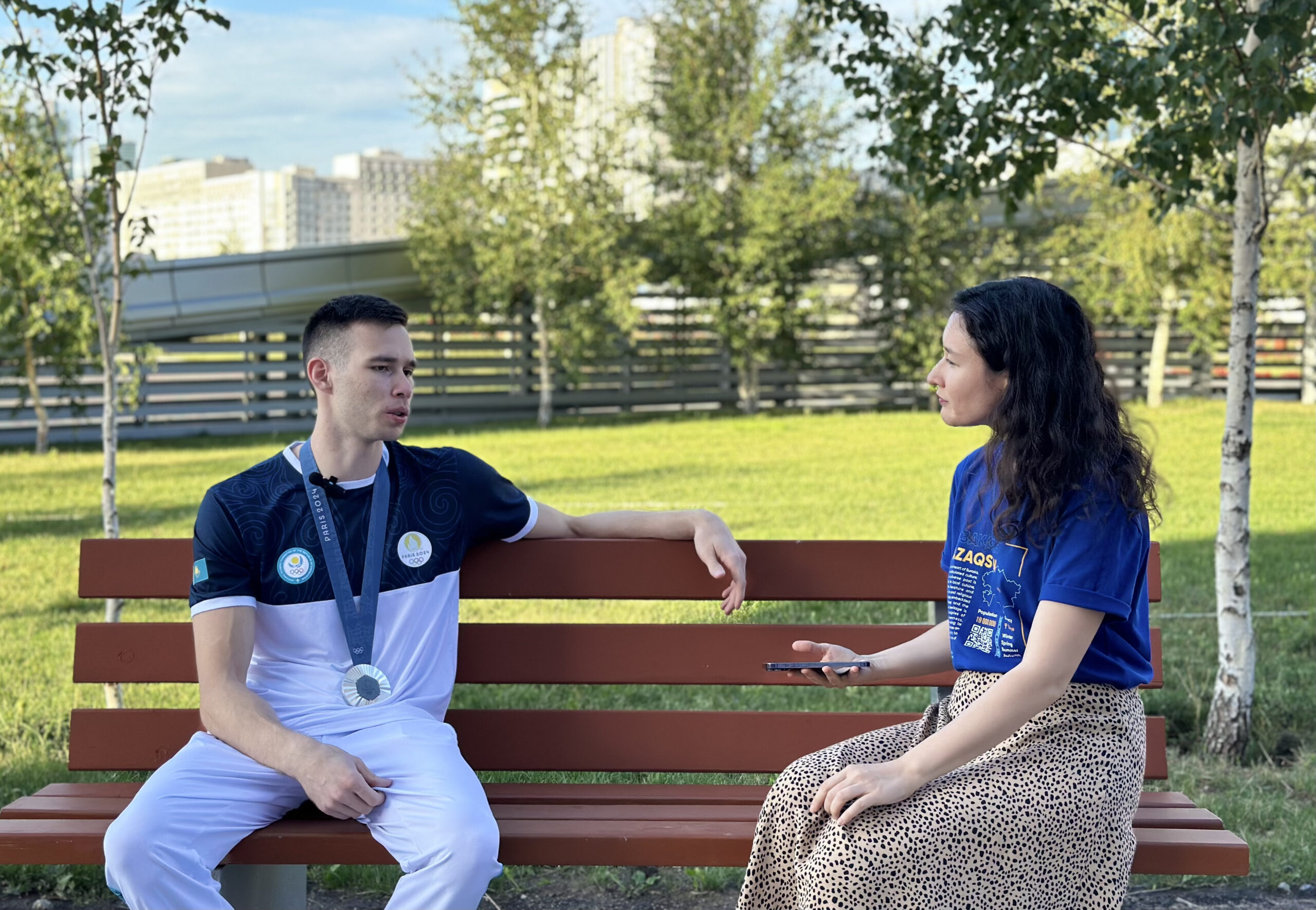
Kurbanov shared his personal journey to the Olympic podium with The Astana Times correspondent Aibarshyn Akhmetkali. Photo credit: Nargiz Raimbekova/The Astana Times
Like father, like son: a family of gymnasts
Kurbanov grew up in a family of gymnasts. His father, Khussaanzhan Kurbanov, was a gymnast specializing in parallel bars. He coached his son from an early age, guiding him to follow in his footsteps. But earlier in the days, Kurbanov reveals he didn’t share the same enthusiasm for gymnastics.
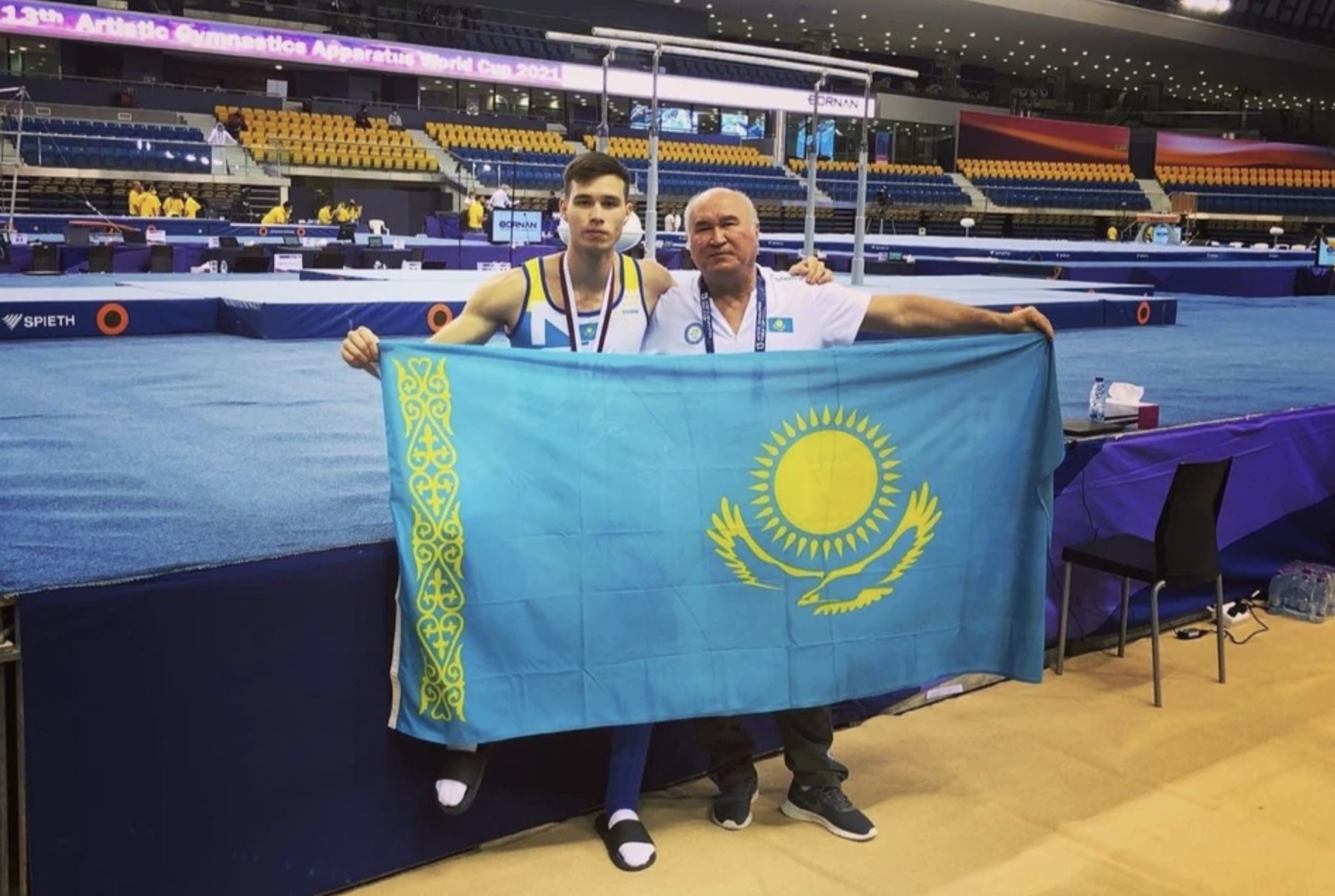
Kurbanov got his start in artistic gymnastics at a young age with his father, Khussaanzhan Kurbanov, being his coach. Photo credit: Komsomolskaya Pravda/kp.kz
“My father, who is also my coach, always dreamed of raising his son to become a gymnast, and of course, to turn him into a champion. It ended up working out like that. At the age of six, he introduced me to gymnastics. From the age of six, he worked with me. But until I turned 18, I didn’t really like gymnastics. I tried to escape from this sport, I wanted to do something like football. My dad was angry about it, and he was strict. I tried to quit several times, but each time he brought me back to gymnastics,” he said.
At 18, Kurbanov faced what he calls a “decisive” period..
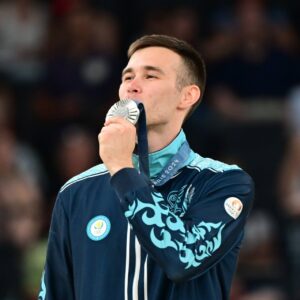
Although Kurbanov did not close out his Paris Olympics with gold, his silver medal made history for Kazakhstan in artistic gymnastics. Photo credit: Sali Sabirov/Kazakh National Olympic Committee
“I’ve had numerous injuries: on my knee, hands, elbows, arms. It was one injury after another, cast after cast. During that time, my dad got concerned about my health and eventually told me that I could choose what I wanted to do,” said Kurbanov.
Despite facing physical challenges, he decided to push forward in sports. “I just wanted to prove to myself, first, and then to everyone else that I could do it,” he added.
“I was faced with the choice of either quitting the sport and learning something new, mastering a new profession, or continuing with gymnastics, but this time, professionally, with full commitment. In the end, I chose the second option, which was to go all the way with gymnastics, because I had spent my whole life in it. I already knew where I could improve, and the results speak for themselves,” said Kurbanov.
He and his father then focused on honing his endurance and coordination over the last years so he could contend with the world’s strongest on the pommel horse. While having a father as a coach brought its own set of challenges, it is what shaped him to be the athlete he is today.
“It’s very hard to spend your whole life talking about a certain sport,” said Kurbanov on a complicated father-son coaching relationship.
“Many athletes with parents as coaches would agree with me—it’s incredibly tough. We talked about training in the gym, in the car, at social gatherings, at home—24/7, it was all about training. Naturally, I wanted to come home to relax a bit, maybe play some games, read books, or watch a TV series, but all the time it was about training,” he said.
Olympic finals: nerves and joys of the competition
Drawn first in the lineup, Kurbanov handled the pressure of leading off at finals. His performance was a demonstration of how difficult and fraught elite gymnastics is. In a sport where one single mistake can shatter the dream of a medal, Kurbanov delivered his finest pommel horse routine at the Olympics.
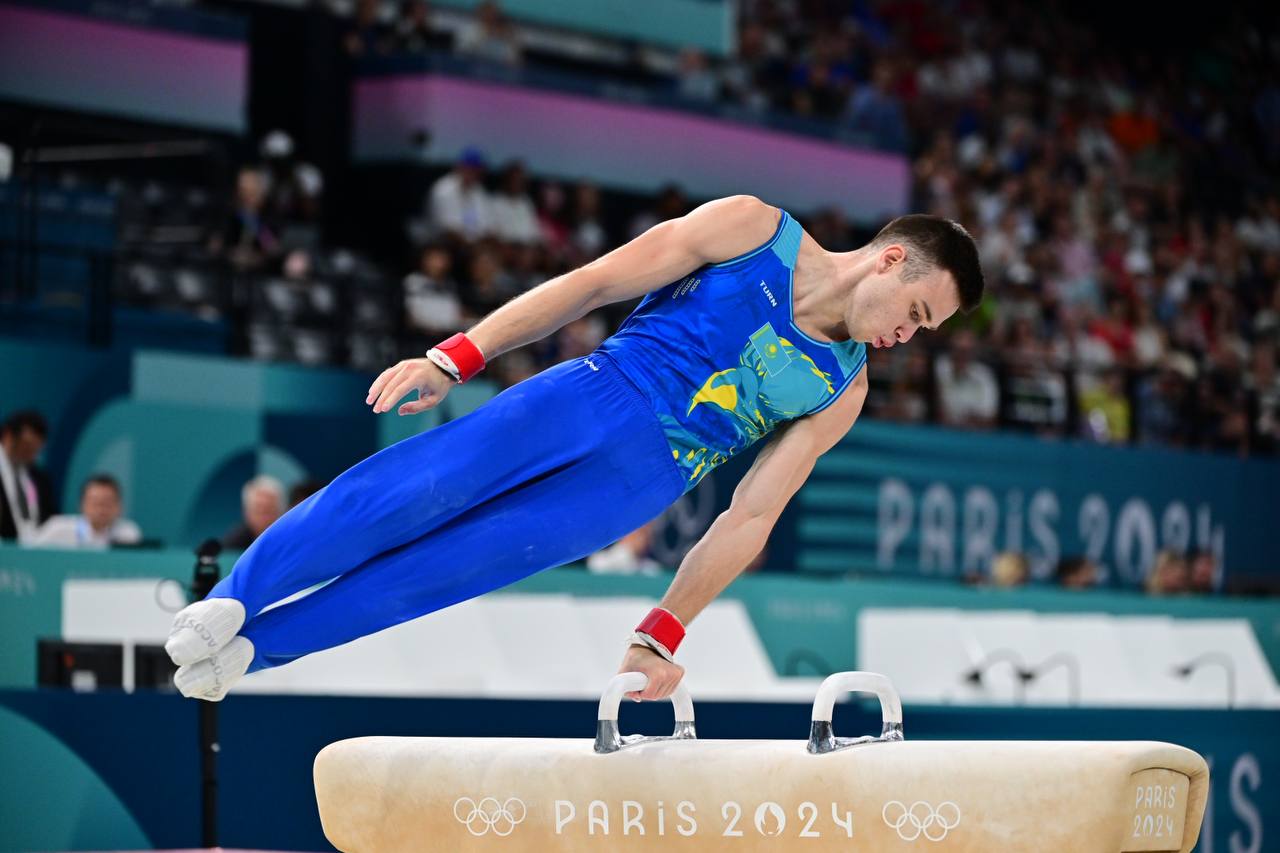
Kurbanov delivered his finest pommel horse routine at the Olympic finals. Photo credit: Sali Sabirov/Kazakh National Olympic Committee
Although he looked very calm and focused during his solid performance, the nerves are always a part of the process. Kurbanov fully felt the weight of expectation after his performance.
“After I made my combination in the final of the Olympic Games, I almost went crazy there while I was waiting for all the [competitors’] scores to appear, almost lost consciousness. In fact, I could not stand on my feet. I sat down, then laid down right in the hall from all this tension in front of thousands of people,” he said.
“Of course, when it was already clear that I had a medal, I was out of words,” added Kurbanov.
Initially, he kept his excitement at check, as the magnitude of his achievement had not fully sunk in yet.
“At first, I saw it as an ordinary medal—something I won, and that was that. But I realized that I had done something historical when I gave interviews, when thousands of fans reached out to me with words of gratitude. That’s when I realized how great of a victory it is,” said Kurbanov.
Although Kurbanov did not close out his Paris Olympics with gold, finishing just behind Ireland’s Rhys McClenaghan, the two-time world champion on the pommel horse, his silver medal made history for Kazakhstan, as the first-ever medal in artistic gymnastics.
What factors into an Olympic success?
Kurbanov said his success at the 2024 Paris Olympics is down to a tireless work ethic.
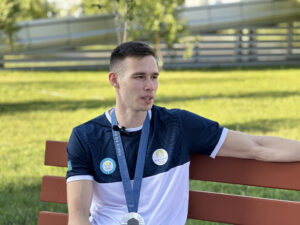
Kurbanov attributes his success at the 2024 Paris Olympics to a tireless work ethic. Photo credit: Nargiz Raimbekova/The Astana Times
“I tell everyone the same thing: it was the discipline that led me to success. That is to do for many-many years even an unloved thing, so to speak, but you know that you have a goal, and that you can achieve it,” said Kurbanov.
There have been many nights over the years where Kurbanov has faced people saying “what a boring life” referring to his tight and difficult routine.
“It’s falling asleep at 10 o’clock at night and getting up at six in the morning. It’s hearing others joke that your life is dull because you don’t drink, you don’t smoke, and you stick to the same routine year after year. But I knew that it would lead me to something greater, and in the end, it led me to a medal,” said Kurbanov.
Artistic gymnastics in Kazakhstan
Kurbanov is happy to embrace his role as a trailblazer for young Kazakh athletes in the arena of artistic gymnastics.
“I believe that, along with our strong gymnastics team, we have a rising generation of young athletes, who are about to join the adult national team, and who have the potential to compete for the highest medal count,” he said.
He also has high praise for the Kazakh national gymnastics team.
“In Kazakhstan, gymnastics has always been strong. Throughout our independence, we’ve had gymnasts capable of winning Olympic medals. But they were often unlucky—lacking the necessary conditions, salaries, and opportunities to go somewhere to compete and make a name for themselves. As a result, many had to leave the sport, either to pursue other sports or different professions altogether,” said Kurbanov.
“Now we are doing much better. As we started to show results, our team has grown. I joined, Milad Karimi joined. We also have better funding and better training conditions now,” he added.
Plans for the next Olympics
Looking ahead to the next Olympic Games, which will take place in Los Angeles in 2028 (LA28), Kurbanov has ambitious plans in mind. Given his age, he should be hitting his prime just about the time of LA28.
“I’m currently at my peak both physically and psychologically, and the next four years are an ideal time for a gymnast in my discipline to give it everything, perform my combinations, and win medals. So, naturally, my goals are the highest,” he said.
Kurbanov will continue working towards qualification for the LA28 with an audacious bid for Olympic gold in artistic gymnastics.
